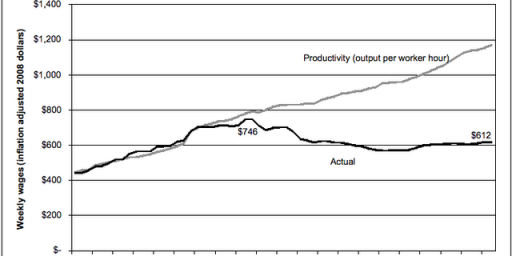China Losing Manufacturing Jobs, Too
UPI – China losing jobs as productivity soars
China is losing manufacturing jobs in the same industries where the United States and other developing countries are seeing jobs vanish, as productivity improves and China sees economic restructuring, a Conference Board study finds. But while China’s manufacturing jobs are declining, service-sector jobs are increasing. “As its manufacturing productivity accelerates, China is losing jobs in manufacturing — many more than the United States is — and gaining them in services, a pattern that has been playing out in the developed world for many years,” according to the study, “China’s Experience with Productivity and Jobs: Benefits and Costs of Change,” released Thursday. The report is a joint venture with the National Bureau of Statistics in China.
Productivity advances have occurred broadly across the industrial sector, with 36 of China’s 38 major industries seeing increases between 1995 and 2002. China’s soaring productivity stems from downsizing and restructuring of government companies, and upsizing of foreign firms and firms with foreign investment as well as private domestic Chinese firms, according to the study.
China’s increase in service jobs and decline in manufacturing jobs is not only part of its economic development but also fits in with domestic and global demand, the study said. Services made up 33.5 percent of China’s gross domestic product in 2002, up from 30.7 percent in 1995. In the United States, there are five service-providing jobs for every goods-producing job. “Both [the Chinese and U.S.] economies will need to find ways to re-employ these workers as the structural changes continue to alter their old industries,” the study said.
***
State data indicates that China’s current unemployment rate is an astonishing 23 percent, compared to 5.6 percent in the United States. The number of people unemployed in China in 1999, estimated at about 169 million, is greater than the entire U.S. workforce today. China is still evolving and finding its niche in the world economy. Domestically, agriculture still employs half of China’s population, compared to 2.5 percent of the U.S. population and 4 percent of the European populace. And on Thursday, media reports said that the United States and China are battling over China’s revocation of Viagra’s patent in China, opening its market for generic manufacturers to make the drug. But a major U.S.-China WTO spat was also resolved, with China saying it would end tax policies that favor Chinese manufacturers and designers of semiconductors, the U.S. Trade Representative’s office announced.
McGuckin noted that 12-15 percent of U.S. jobs are created and destroyed every year as its economy evolves. Now, China is experiencing this “creative destruction” as well, he said. “One wants to do everything possible to ease the transition, but you don’t want to stop it,” he said.
Apparently, President Bush has managed to screw up the Chinese economy, too. All I know is that there were plenty of jobs–good jobs–when Bill Clinton was president.






Heh. See Blame Bush . Because, as that website says, Bush is to blame for everything. Even the thunderstorm that’s headed my way (probably caused by his refusal to sign the Kyoto suicide pact, yanno…).
I know Bush is responsible for my not winning any caption contests in the last week. Him and Cheney. And Condi.
And Rove. Darn that Karl Rove.
Clinton signed the trade deal with China. I assume he was bribed.